Blood money
Jeremy Clarke
Isliced off the top of the scab under my right nostril with the razor again. I'd skirted carefully round it when shaving at leisure during Christmas week, but already late for my appointment at the bank, and shaving quickly and carelessly, I accidentally whisked it off.
The amount of blood oozing out of such a tiny nick was hard to credit. I couldn't staunch it, either. Then I remembered reading in the SAS survival handbook I was given for Christmas that cobwebs are effective for healing small cuts (as are a handful of live maggots, incidentally, for larger ones). The choice of cobwebs in my bedroom was tremendous. While making my selection I made a New Year resolution to read only survival hooks in future. In the past I've believed that if I read enough highbrow books I might understand something. But all the books I've read comparing theories about truth, or putting forward theories about why people live in groups, or arguing whether it is faith or works that determines one's long-term prospects, I'd swap for one SAS survival handbook containing a practical use for cobwebs. No contest. I pulled a cobweb away from the ceiling, tore a bit off and stuck it to my upper lip. It staunched the blood almost immediately.
At the bank, my appointment was with the deputy manager, whom I'd not met. I needed to restructure my borrowing, he'd told me on the telephone at nine a.m. on 2 January, as a matter of some urgency. Five minutes late, I introduced myself to a cashier, then the deputy manager came out from behind the glass and led me into a cupboard-sized room furnished with two chairs, a table, a computer and a faded print of Van Gogh's 'Sunflowers'. He looked about 15. I should call him Nick, he said, then, 'Good Christmas?"No, Nick,' I said.
What we were going to do, explained Nick, was to key into the computer the details of my financial situation, then ask it to authorise an adjustment of my loan repayments, which, at their present rate, were not doing me any favours. Whatever decision the computer reached, Nick was sorry to say, would be final. If it was up to him he'd amalgamate and extend the loans, lend me money, increase my overdraft, anything to get me out of my hole. But the command structure of the bank that he worked for unfortunately put us both at the mercy of the computer on the desk in front of us. There wasn't a branch manager in the land, let alone a deputy manager, who could gainsay it. On paper, my application didn't look very promising, but the computer's judgments were surprisingly capricious, so it was worth a try. And if he sexed up my application wherever possible, said Nick, our chances of a favourable decision would be increased.
I was warming to this deputy bank manager. I wouldn't go as far as to describe him as a man who has been sniffed by wolves, but there was definitely something unbank-like about him. Really. I should have been put up against a wall and shot. But faced with a choice between loyalty to an omnipotent computer or loyalty to a fellow human being, albeit an extremely foolish one, Nick, God bless him, was showing himself to be a man of the people. In the world of finance it is an allegiance that will only lead him to disaster, I fear. Seeing how young, human and passionate Nick was. I should have done him a favour and suggested we robbed the place there and then.
While entering my details in the appropriate boxes on the screen, Nick noticed that, in spite of my having reached my overdraft limit, I had issued cheques for a further £300 in the third week of December. 'You didn't have such a bad Christmas as all that, then,' he said, concentrating on the screen. From the catalogue of woe that was passing across the computer screen in front of him, it was his only quibble. 'The last kick of a dying horse, Nick,' I said.
Finally he slapped the 'We prostrate ourselves before you 0 computer!' key and we sat back to await the decision. There was an element of excitement in the room, as if we were waiting for the racing results. The decision though, when it came up on screen, was unfavourable. Nick was more disappointed than I was. He rested his head on the heel of his hand to rethink our strategy. Then he said: 'Mr Clarke, what's that on your lip?'


































































 Previous page
Previous page